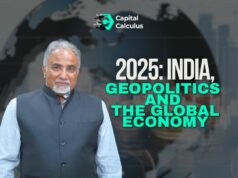U.S. Secretary of State Marco Rubio warned Panama’s President José Raul Mulino on Sunday that Washington would “take necessary measures” if Panama fails to act swiftly in ending China’s influence over the Panama Canal, as viewed by President Donald Trump.
Mulino, after the talks with the top U.S. diplomat in Panama City, signalled he would review agreements involving China and Chinese businesses, and announced further cooperation with the U.S. on migration, but reiterated that his country’s sovereignty over the world’s second busiest waterway is not up for discussion.
Threat To US-Panama Treaty
Rubio delivered a message from Trump that China’s presence and influence – through a Hong Kong-based company operating two ports near the canal’s entrances – was a threat to the waterway and a violation of the U.S.-Panama treaty, U.S. State Department spokesperson Tammy Bruce said in a statement.
“Secretary Rubio made clear that this status quo is unacceptable and that absent immediate changes, it would require the United States to take measures necessary to protect its rights under the Treaty,” Bruce said.
Rubio did not spell out exactly what steps Panama must take to curb China’s influence or what U.S. retaliation would look like.
Trump’s Panama Threat
Upon returning to office, Trump threatened to take control of the Panama Canal, built by the United States in the early 20th century and handed over to Panama in 1999, claiming the canal is being operated by Beijing.
He has refused to rule out the use of military force over Panama, drawing criticism from Washington’s Latin American friends and foes alike. On Sunday, Trump said that he did not think troops would be necessary, but that Panama had violated the agreement and the United States would take back the canal.
“China’s running the Panama Canal. That was not given to China, that was given to Panama – foolishly – but they violated the agreement, and we’re going to take it back, or something very powerful is going to happen,” Trump told reporters.
“I don’t think troops will be necessary in Panama,” he added.
Rubio, a longtime China hawk during his Senate career, said last week on Sirius XM’s The Megyn Kelly Show that China could use the ports to shut down the canal, a vital route for U.S. shipping, in the event of a conflict between Beijing and Washington.
Mulino said his meeting with Rubio was respectful and cordial. He showed willingness to review some Chinese businesses in Panama, including a key 25-year concession to Hong Kong-based CK Hutchison Holdings renewed in 2021 for the operation of ports at both entrances of the canal, pending the results of an audit.
China’s Influence In Panama
The contract has been targeted by U.S. lawmakers and the government as an example of China’s expansion in Panama, which they claim goes against a neutrality treaty signed by both countries in 1977.
Panama’s government and some experts reject that assertion, mainly because the ports are not part of the canal’s operations. The canal is operated by the Panama Canal Authority, an autonomous agency overseen by the Panamanian government.
A broad agreement between Panama and China to contribute to China’s Belt and Road initiative, under which the Asian country expanded investment in Panama during previous administrations, will not be renewed, Mulino said.
“We’ll study the possibility of terminating it early,” he added.
“I do not feel that there is any real threat at this time against the (neutrality) treaty, its validity, and much less the use of military force to make the treaty,” Mulino said, adding that it will be important to have face-to-face talks with Trump.
Rubio’s First Tour
Rubio later visited the Miraflores Locks through which ships pass between the Pacific and the canal. Canal officials briefed Rubio as a Panamanian-flagged LPG carrier entered a lock from the canal to descend to the Pacific.
China has said it plays no part in operating the canal and that it respects Panama’s sovereignty and independence over the waterway.
“Never ever has China interfered,” Chinese Foreign Ministry spokesperson Mao Ning said when asked about the U.S. claims last month, adding that China recognizes the canal as “a permanently neutral international waterway.”
Rubio is touring Central America and the Caribbean on his first foray in the post as he seeks to refocus U.S. diplomacy on the Western Hemisphere – in part to recruit help in stemming migration toward the U.S. southern border.
The visit also reflects a U.S. desire to counter China’s growing economic and political influence in Latin America.
(With inputs from Reuters)




